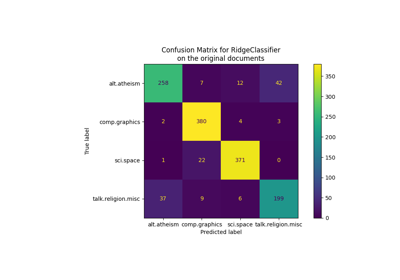ComplementNB#
- class sklearn.naive_bayes.ComplementNB(*, alpha=1.0, force_alpha=True, fit_prior=True, class_prior=None, norm=False)#
The Complement Naive Bayes classifier described in Rennie et al. (2003).
The Complement Naive Bayes classifier was designed to correct the “severe assumptions” made by the standard Multinomial Naive Bayes classifier. It is particularly suited for imbalanced data sets.
Read more in the User Guide .
Added in version 0.20.
- Parameters:
- alphafloat or array-like of shape (n_features,), default=1.0
加性(拉普拉斯/利德斯通)平滑参数 (设置 alpha=0 并将 force_alpha=True,则不进行平滑)。
- force_alphabool, default=True
如果为 False 且 alpha 小于 1e-10,则会将 alpha 设置为 1e-10。如果为 True,alpha 将保持不变。如果 alpha 过于接近 0, 可能会导致数值错误。
Added in version 1.2.
Changed in version 1.4:
force_alpha的默认值更改为True。- fit_priorbool, default=True
仅在训练集中只有一个类的边缘情况下使用。
- class_priorarray-like of shape (n_classes,), default=None
类的先验概率。不使用。
- normbool, default=False
是否执行权重的第二次归一化。默认行为与 Mahout 和 Weka 中的实现相似, 它们不遵循论文表 9 中描述的完整算法。
- Attributes:
- class_count_ndarray of shape (n_classes,)
拟合过程中遇到的每个类的样本数量。提供样本权重时,该值会被加权。
- class_log_prior_ndarray of shape (n_classes,)
每个类的平滑经验对数概率。仅在训练集中只有一个类的边缘情况下使用。
- classes_ndarray of shape (n_classes,)
分类器已知的类标签
- feature_all_ndarray of shape (n_features,)
拟合过程中遇到的每个特征的样本数量。提供样本权重时,该值会被加权。
- feature_count_ndarray of shape (n_classes, n_features)
拟合过程中遇到的每个(类,特征)的样本数量。提供样本权重时,该值会被加权。
- feature_log_prob_ndarray of shape (n_classes, n_features)
类补集的经验权重。
- n_features_in_int
在 fit 期间看到的特征数量。
Added in version 0.24.
- feature_names_in_ndarray of shape (
n_features_in_,) 在 fit 期间看到的特征名称。仅当
X具有全为字符串的特征名称时定义。Added in version 1.0.
See also
BernoulliNB多变量伯努利模型的朴素贝叶斯分类器。
CategoricalNB分类特征的朴素贝叶斯分类器。
GaussianNB高斯朴素贝叶斯。
MultinomialNB多项式模型的朴素贝叶斯分类器。
References
Rennie, J. D., Shih, L., Teevan, J., & Karger, D. R. (2003). Tackling the poor assumptions of naive bayes text classifiers. In ICML (Vol. 3, pp. 616-623). https://people.csail.mit.edu/jrennie/papers/icml03-nb.pdf
Examples
>>> import numpy as np >>> rng = np.random.RandomState(1) >>> X = rng.randint(5, size=(6, 100)) >>> y = np.array([1, 2, 3, 4, 5, 6]) >>> from sklearn.naive_bayes import ComplementNB >>> clf = ComplementNB() >>> clf.fit(X, y) ComplementNB() >>> print(clf.predict(X[2:3])) [3]
- fit(X, y, sample_weight=None)#
拟合朴素贝叶斯分类器根据 X, y。
- Parameters:
- X{array-like, sparse matrix},形状为 (n_samples, n_features)
训练向量,其中
n_samples是样本的数量,n_features是特征的数量。- yarray-like,形状为 (n_samples,)
目标值。
- sample_weightarray-like,形状为 (n_samples,),默认=None
应用于单个样本的权重(1. 表示未加权)。
- Returns:
- selfobject
返回实例本身。
- get_metadata_routing()#
获取此对象的元数据路由。
请查看 用户指南 以了解路由机制的工作原理。
- Returns:
- routingMetadataRequest
MetadataRequest封装的 路由信息。
- get_params(deep=True)#
获取此估计器的参数。
- Parameters:
- deepbool, 默认=True
如果为True,将返回此估计器和包含的子对象(也是估计器)的参数。
- Returns:
- paramsdict
参数名称映射到它们的值。
- partial_fit(X, y, classes=None, sample_weight=None)#
增量拟合一批样本。
该方法预计会连续调用多次,对数据集的不同块进行处理,以实现核外或在线学习。
当整个数据集太大而无法一次性装入内存时,这特别有用。
该方法有一些性能开销,因此最好在尽可能大的数据块上调用partial_fit(只要在内存预算内)以隐藏开销。
- Parameters:
- X{array-like, sparse matrix},形状为(n_samples, n_features)
训练向量,其中
n_samples是样本数量,n_features是特征数量。- y形状为(n_samples,)的array-like
目标值。
- classes形状为(n_classes,)的array-like,默认=None
可能出现在y向量中的所有类的列表。
必须在第一次调用partial_fit时提供,后续调用中可以省略。
- sample_weight形状为(n_samples,)的array-like,默认=None
应用于单个样本的权重(未加权为1.)。
- Returns:
- selfobject
返回实例本身。
- predict(X)#
执行对测试向量数组X的分类。
- Parameters:
- X形状为 (n_samples, n_features) 的类数组
输入样本。
- Returns:
- C形状为 (n_samples,) 的 ndarray
X的预测目标值。
- predict_joint_log_proba(X)#
返回测试向量X的联合对数概率估计。
- 对于X的每一行x和类别y,联合对数概率由以下公式给出
log P(x, y) = log P(y) + log P(x|y),
其中
log P(y)是类别先验概率,log P(x|y)是类别条件概率。- Parameters:
- X形状为(n_samples, n_features)的类数组
输入样本。
- Returns:
- C形状为(n_samples, n_classes)的ndarray
返回模型中每个类别的样本的联合对数概率。列对应于按属性:term:
classes_中出现的顺序排序的类别。
- predict_log_proba(X)#
返回测试向量 X 的对数概率估计。
- Parameters:
- X形状为 (n_samples, n_features) 的类数组
输入样本。
- Returns:
- C形状为 (n_samples, n_classes) 的类数组
返回模型中每个类别的样本的对数概率。列对应于按排序顺序出现的类别,如属性 classes_ 中所示。
- predict_proba(X)#
返回测试向量X的概率估计。
- Parameters:
- X形状为 (n_samples, n_features) 的类数组
输入样本。
- Returns:
- C形状为 (n_samples, n_classes) 的类数组
返回模型中每个类别的样本概率。列对应于按排序顺序出现的类别,如属性 classes_ 中所示。
- score(X, y, sample_weight=None)#
返回给定测试数据和标签的平均准确率。
在多标签分类中,这是子集准确率,这是一个严格的指标,因为你要求每个样本的每个标签集都被正确预测。
- Parameters:
- X形状为 (n_samples, n_features) 的类数组
测试样本。
- y形状为 (n_samples,) 或 (n_samples, n_outputs) 的类数组
` X`的真实标签。
- sample_weight形状为 (n_samples,) 的类数组,默认=None
样本权重。
- Returns:
- scorefloat
self.predict(X)相对于y的平均准确率。
- set_fit_request(*, sample_weight: bool | None | str = '$UNCHANGED$') ComplementNB#
Request metadata passed to the
fitmethod.Note that this method is only relevant if
enable_metadata_routing=True(seesklearn.set_config). Please see User Guide on how the routing mechanism works.The options for each parameter are:
True: metadata is requested, and passed tofitif provided. The request is ignored if metadata is not provided.False: metadata is not requested and the meta-estimator will not pass it tofit.None: metadata is not requested, and the meta-estimator will raise an error if the user provides it.str: metadata should be passed to the meta-estimator with this given alias instead of the original name.
The default (
sklearn.utils.metadata_routing.UNCHANGED) retains the existing request. This allows you to change the request for some parameters and not others.Added in version 1.3.
Note
This method is only relevant if this estimator is used as a sub-estimator of a meta-estimator, e.g. used inside a
Pipeline. Otherwise it has no effect.- Parameters:
- sample_weightstr, True, False, or None, default=sklearn.utils.metadata_routing.UNCHANGED
Metadata routing for
sample_weightparameter infit.
- Returns:
- selfobject
The updated object.
- set_params(**params)#
设置此估计器的参数。
该方法适用于简单估计器以及嵌套对象(例如
Pipeline)。后者具有形式为<component>__<parameter>的参数,以便可以更新嵌套对象的每个组件。- Parameters:
- **paramsdict
估计器参数。
- Returns:
- selfestimator instance
估计器实例。
- set_partial_fit_request(*, classes: bool | None | str = '$UNCHANGED$', sample_weight: bool | None | str = '$UNCHANGED$') ComplementNB#
Request metadata passed to the
partial_fitmethod.Note that this method is only relevant if
enable_metadata_routing=True(seesklearn.set_config). Please see User Guide on how the routing mechanism works.The options for each parameter are:
True: metadata is requested, and passed topartial_fitif provided. The request is ignored if metadata is not provided.False: metadata is not requested and the meta-estimator will not pass it topartial_fit.None: metadata is not requested, and the meta-estimator will raise an error if the user provides it.str: metadata should be passed to the meta-estimator with this given alias instead of the original name.
The default (
sklearn.utils.metadata_routing.UNCHANGED) retains the existing request. This allows you to change the request for some parameters and not others.Added in version 1.3.
Note
This method is only relevant if this estimator is used as a sub-estimator of a meta-estimator, e.g. used inside a
Pipeline. Otherwise it has no effect.- Parameters:
- classesstr, True, False, or None, default=sklearn.utils.metadata_routing.UNCHANGED
Metadata routing for
classesparameter inpartial_fit.- sample_weightstr, True, False, or None, default=sklearn.utils.metadata_routing.UNCHANGED
Metadata routing for
sample_weightparameter inpartial_fit.
- Returns:
- selfobject
The updated object.
- set_score_request(*, sample_weight: bool | None | str = '$UNCHANGED$') ComplementNB#
Request metadata passed to the
scoremethod.Note that this method is only relevant if
enable_metadata_routing=True(seesklearn.set_config). Please see User Guide on how the routing mechanism works.The options for each parameter are:
True: metadata is requested, and passed toscoreif provided. The request is ignored if metadata is not provided.False: metadata is not requested and the meta-estimator will not pass it toscore.None: metadata is not requested, and the meta-estimator will raise an error if the user provides it.str: metadata should be passed to the meta-estimator with this given alias instead of the original name.
The default (
sklearn.utils.metadata_routing.UNCHANGED) retains the existing request. This allows you to change the request for some parameters and not others.Added in version 1.3.
Note
This method is only relevant if this estimator is used as a sub-estimator of a meta-estimator, e.g. used inside a
Pipeline. Otherwise it has no effect.- Parameters:
- sample_weightstr, True, False, or None, default=sklearn.utils.metadata_routing.UNCHANGED
Metadata routing for
sample_weightparameter inscore.
- Returns:
- selfobject
The updated object.



